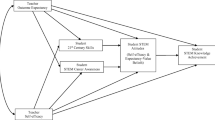Abstract
THIS INQUIRY examined the effectiveness of self-evaluation strategies to supplement computerized evaluation of constructed response answers. Additionally, self-evaluation was looked at as a means to improve learner recall of factual and comprehensive knowledge. The study compared the effects of five constructed response answer evaluation strategies on achievement and instructional time during computer-based learning. The five strategies were:
-
1)
computerized evaluation only,
-
2)
student evaluation only,
-
3)
computerized evaluation and student evaluation,
-
4)
student evaluation with required elaboration, and
-
5)
computer and student evaluation with elaboration following conflicting evaluations.
Analysis of the collected data revealed that achievement, as measured in this study, was unaffected by evaluation strategy. Accordingly, treatments did not affect student evaluation of responses. Across all self-evaluation groups, student evaluation did not differ substantially from expert evaluation, which may indicate that students can accurately evaluate their own work. The treatment strategies did differentially affect instructional time, with instructional time increasing as the level of interaction with the instructional software increased. Implications for the design of instructional software are discussed.
Similar content being viewed by others
References
Alessi, S M. (1991).Computer-based instruction methods and development. Englewood Cliffs, NJ: Prentice-Hall Inc.
Boud, D. J. & Falchikov, N. (1989). Quantitative studies of student self-assessment in higher education: A critical analysis of findings.Higher Education, 18(5), 529–549.
Boyd, D. & Cowan, J. (1985). A case for self-assessment based on recent studies of student learning.Assessment and Evaluation in Higher Education, 10(3), 225–35.
Braun, H. I., Bennett, R.E., Frye, D. & Soloway, E. (1990). Scoring constructed responses using expert systems.Journal of Educational Measurement, 27(2), 93–108.
Burns, E. (1990). Multiple-choice computer diagnostic test designs.Educational Technology, 28(12), 49–53.
Dwyer, F.M. (1972).A guide for improving visualized instruction. State College, PA: Learning Services.
Dwyer, F.M. (1978).The human heart: parts of the heart circulation of blood and cycle of blood pressure. State College, PA: Learning Services.
Dwyer, F.M. & Lamberski, R.J. (1980).The human heart: parts of the heart circulation of blood and cycle of blood pressure. State College, PA: Learning Services.
Edwards, R. (1989). An experiment in student self-assessment.British Journal of Educational Technology, 20 (1), 5–10.
Gagné, E. (1985).The cognitive psychology of school learning. Boston: Little, Brown and Company.
Kee, D.W & Davies, L. (1990). Mental effort and elaboration: Effects of accessibility and instruction.Journal of Experimental Child Psychology, 49, 264–274.
Levin, J.R. (1988). Elaboration-based learning strategies powerful theory: Powerful application.Contemporary Educational Psych, 13, 191–205.
Jonassen, D.H. (1988).Instructional designs for microcomputer courseware. Hillsdale, New Jersey: Lawrence Erlbaum Associates.
Maqsud, M. & Pillai, C.M. (1991). Effect of self-scoring on subsequent performance in academic achievement test.Educational Research, 33(2), 151–154.
Marrone, J. A. (1990).Learner response to computerized answer judging and its effect on learning and retention.Doctoral dissertation, The Pennsylvania State University.
Pollock, J.C. & Sullivan, H.J. (1990). Practice mode and learner control in computer-based instruction.Contemporary Educational Psychology, 15, 251–260.
Ryan, A.W. (1991). Meta-analysis of achievement effects of microcomputer applications in elementary schools.Educational Administration Quarterly, 5(2), 161–184.
Schunk, D. (1982). Effects of effort and attributional feedback on children’s perceived self-efficacy and achievement.Journal of Educational Psychology, 74(4), 548–556.
Shepard, L.A. (1989). Why we need better assessments.Educational Leadership, 46(7), 4–9.
Tittle, C.K. (1991). Changing models of student and teacher assessment.Educational Psychologist, 26(2), 157–165.
Wager, W. & Wager, S. (1985). Presenting questions, processing responses, and providing feedback in CAI.Journal of Instructional Development, 8(4), 2–8.
Wittrock, M.C. (1974). Learning as a generative activity.Educational Psychologist, 11, 87–95.
Wittrock, M.C. (1978). The cognitive movement in instruction.Educational Psychologist, 15, 15–29.
Author information
Authors and Affiliations
Corresponding author
Additional information
ABOUT THE AUTHORS
William J. Gibbs, Ph.D. is an Assistant Professor and the Assistant Director of Media at Eastern Illinois University.
Kyle L. Peck, Ph.D. is an Associate Professor of Education at The Pennsylvania State University Department of Adult Education and Instructional Systems.
Rights and permissions
About this article
Cite this article
Gibbs, W.J., Peck, K.L. An approach to designing computer-based evaluation of student constructed responses: Effects on achievement and instructional time. J. Comput. High. Educ. 6, 99–119 (1995). https://doi.org/10.1007/BF02941040
Issue Date:
DOI: https://doi.org/10.1007/BF02941040




